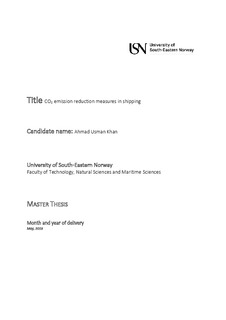| dc.description.abstract | As the dominant source of global trade and transport, the shipping industry contributes overwhelmingly to the environmental deterioration compared to other modes of transportation. Stakeholders - from consumers, shippers, cargo owners, governmental institutions, suppliers to international community – have consistently been raising their concerns in addressing the environmental hazards and resource depletion. The shipping industry with 90% of the international trade mobilization has a lot to contribute to deteriorating global environment as the volume of trade is accelerating globally with increasing population. To help protect biosphere and environment and address the societal concerns about environment while be profitable in their operations, many shipping firms have been investing in different operational and technological measures to curtail the GHG emissions from shipping. This paper aims to review the existing body of literature on the available measures that can be undertaken for fuel efficiency and/or emission reduction, along with hurdles and policy implications for future. | nb_NO |
